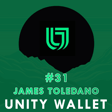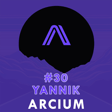
#16 DeFi Trading and Token Management with Rigoblock creator Gabriele Rigo | POT: The Cryptocurrency Podcast
Gabriele is the creator of Rigoblock an on-chain protocol for asset management, aiming to democratize the trading and investment landscape. The platform empowers aspiring traders to deploy DeFi strategies swiftly and cost-effectively.
Rigoblock facilitates the creation of "smart pools" - smart contracts that hold tokens and interact with external applications, ranging from decentralized exchanges to governance and staking applications.
One of the unique features of Rigoblock is its ability to build a publicly verifiable track record for traders, enhancing transparency and security within the DeFi ecosystem. It abstracts the complexities of token approvals, mitigating the risks associated with token mismanagement and approval exploits, thereby safeguarding trader assets.
Rigoblock can be used by individual traders willing to explore the DeFi world of trading, and even by institutional investors that can operate a pool where users can deposit their funds.
From Traditional Finance to Crypto Innovation
Gabriele's journey into the crypto was fueled by the value of Bitcoin as a hedge against monetary inflation, eventually leading him to Ethereum for decentralized applications. His background in hedge fund trading and risk assessment laid the groundwork for developing Rigoblock. The platform's inception was driven by the vision to leverage Ethereum for asset management, a vision that required navigating the young ecosystem of Solidity development and decentralized exchanges.
Rigoblock's Governance and Security Model
Rigoblock is a community-driven ecosystem governed by its users through the GRG token. This governance model ensures that the protocol evolves in alignment with the collective interests of its stakeholders, from approving new applications to overseeing protocol upgrades. A nuanced governance mechanism balances innovation with security, allowing pool operators to opt into upgrades while safeguarding their assets against potential governance attacks.
Rigoblock opens up new paradigms for asset managers, enabling both manual and automated management of pooled assets. The platform's design eradicates the traditional fee structures, replacing them with a performance-based reward system driven by the GRG token. This model incentivizes pool operators to enhance the protocol's security and their pools' performance, creating a win-win situation for both managers and investors.
As the DeFi landscape continues to evolve, so does the conversation around security, trust, and adoption. Gabriele envisions a future where DeFi's inherent transparency and verifiability foster a new era of asset management, but acknowledges the ongoing challenges in completely eliminating trust from the equation.
This podcast is fueled by Aesir, an Algorithmic cryptocurrency Trading Platform that I helped develop over the last 2 years that offers a unique set of features.



















